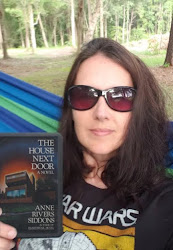My wife and I were out having dinner with friends the other night when the discussion came around to books and reading (as it often does). Now don’t get me wrong, I love talking about books. Reading and writing are a huge part of my life and so naturally they come up a lot, but I always sort of dread the ol’ question: So what do you like to read?
The boring, untruthful answer would be: “Anything, really. Please pass the eggrolls.”
Which is what I’d say if I was trying to keep things civil. The problem is I don’t like to read just anything. I don’t like reading most things, actually. And the things I like to read are often weird and strange. At the time I’d had a few cocktails, so I answered truthfully. The conversation went something like this:
Me: “I like what’s known as ‘speculative fiction’.”
Them: “What the heck is that?”
Me: “Well, I don’t know exactly. It’s kind of a big classification. Sort of a ‘genre-du jour’, if you will.”
Them: “So you’re telling me you read it, but you don’t know what it is.”
Me: “It’s sort of like this, you have your normal fiction in this hand, right? This is the stuff about addiction and loss and inner turmoil and daddy issues and failed marriages and sexual ambiguity and whatnot that your professors made you read in college. Then in your other hand you have…speculative fiction.”
Them: “Like what? Vampires and wizards and all that junk?”
Me: “No—I mean yes, but not necessarily. It’s just fiction that is about…stuff that doesn’t exist.”
Them: “So vampires and wizards.”
Me: (sigh) “I guess, yeah. Vampires and wizards. Anybody need another drink?”
And that’s that.
The problem is, speculative fiction covers all of those “normal” topics too. Speculative fiction books address all of the addiction and the daddy issues and the inner turmoil and whatnot as well, they just do it with…vampires and wizards. And sometimes they tackle these topics with ghosts, or robots, or magic, or a whole myriad of other strange and weird things.
So you can see my problem. I have no idea what type of books I like, I just know I like them. I can tell you with some authority, however, that whatever it is that you are currently reading, I’d probably like it as well…If you were to throw a wizard or a robot in there somewhere. But then again, what isn’t improved by the addition of the odd wizard or robot?
Now, you may be wondering just how many wizards and robots I have packed into my own book Blue Fall. The answer might surprise you: None. That’s right! Not a single wizard to be seen! No elves, no ghosts, no zombies, no vampires, no post-apocalyptic scenarios. Nada. And yet, I am comfortable calling it speculative fiction. Why? Because (and I say this in the best way possible) it’s a little…off. It is the product of a wild imagination.
And maybe therein lies the best description of speculative fiction: The stuff of wild imagination.
-B. B. Griffith
www.griffithpublishing.com
Blue Fall is an award winning techno-thriller that is perfectly happy with being described as speculative fiction. It is available in print and for your Kindle.
Kindle | Amazon | B&N
Thank you so much for the discussion today, Brad!
Blue Fall is the first book in B.B. Griffith's new series The Tournament:
"There was a time...long ago, when whole nations, entire races of people, pinned their hopes and futures on individual warriors. Whole wars were won and lost on the outcome of a single battle between heroes. Entire countries were moved. Empires rose and fell..."
In Blue Fall, that time has come again.
A routine investigation throws a hapless insurance agent down the rabbit hole, into a world where the rich and powerful place wagers on the greatest game on earth. They call it the Tournament. It offers competition without limits. It is beholden to no man, and constrained by no law, and it is extremely dangerous. But where does the true power lie in this World Cup of warfare? With those who place the bets, or with the deadly players themselves? And can one man expose the secret before they find him?
Do you guys find yourselves having a hard time explaining what you like to read? Do you go by specific genres or do you find yourself using broader terms like "speculative fiction" or "YA"? I think I do a little bit of both. I love the term "speculative fiction" because it encompasses most of the genres I love to read, but sometimes it's easier just to pigeonhole myself as a "horror reader" because a lot of the books I read outside the horror genre are still dark or horrific in some way.











This is a great post! And so very, very true. I like the term "speculative fiction" because it's a fancy name for... vampires and wizards. And in conversation, people hate to look like they don't know it all sometimes so when asked what I read, if I say spec fic, people will just shrug and go on.
ReplyDeleteIf they make the connection to what the genre usually entails, or actually ask... well, it goes downhill. "Serious readers" seem to think there's nothing to learn in fantasy, same way some adults insist on YA books being worthless for adults. Frankly, I've learned the best lessons in life from Spec Fic. The books that have managed to move me to tears are spec fic, too!
What a helpful post! I never knew how to define speculative fiction at all. I feel like I as a book blogger I should know these things but I really don't. I learn them as I go. Thanks for the great post.
ReplyDelete